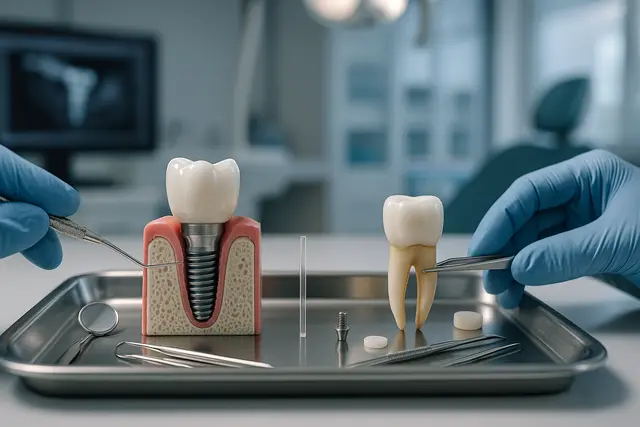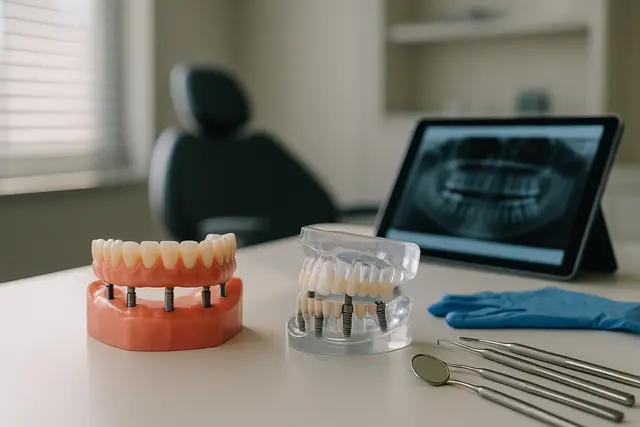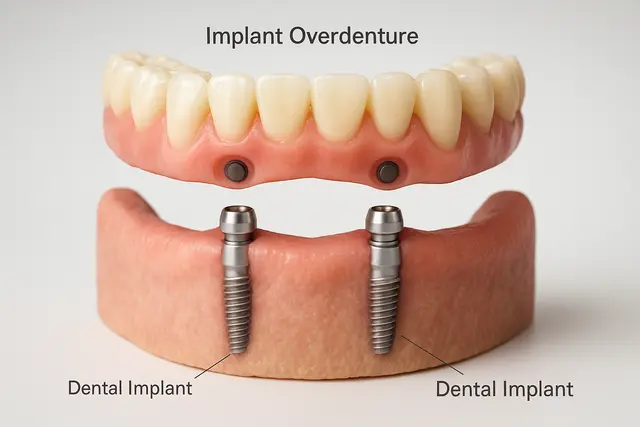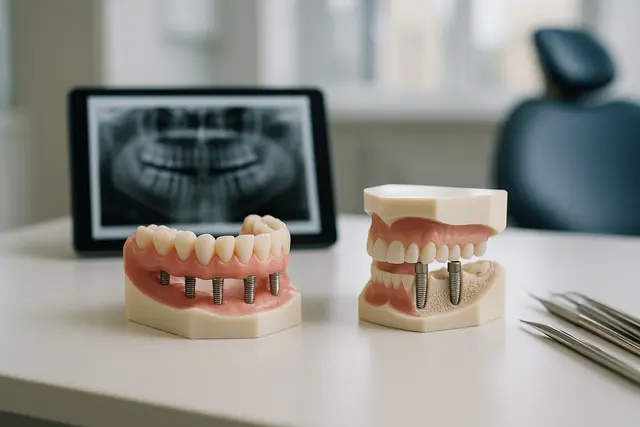Prosthodontics
5 min read
Oct 21, 2025
Implant vs. Crown: Durability and Longevity
Choosing between a dental implant and a crown can be overwhelming, especially when you're trying to weigh long-term durability, comfort, cost, and care. Both options serve unique purposes in restoring your smile, but understanding their key differences is essential to making the right decision for your oral health.

If you’re staring down the barrel of tooth loss or a badly damaged chomper, the decision between a dental implant and a dental crown can feel like picking the best out of two slightly intimidating strangers. One is surgically installed like a titanium superhero, and the other fits snugly over your natural tooth like a custom-made hat. Both have perks, both cost money, and both aim to give you a confident smile that doesn’t betray its artificial parts.
Understanding the Dental Implant
A dental implant is a titanium post surgically placed into the jawbone, acting as an artificial tooth root. It replaces missing teeth by anchoring a realistic-looking artificial tooth. Through a process called osseointegration, your jawbone fuses with the titanium post, offering a solid foundation that mimics the stability of natural teeth. Once the implant post is healed, an abutment connects it to the visible part: the implant crown.
The dental implant process can take several months from start to finish, but what you get is a long-term, often permanent solution that feels and functions like the real deal. And because the dental implant is a titanium post, it offers unmatched durability and helps with preserving jawbone health.
Breaking Down the Dental Crown
A dental crown is basically a protective cover for a damaged or weakened tooth. Unlike implants, crowns may not involve any surgery. If your natural tooth root is still in place and salvageable, your dentist will reshape the tooth, and the crown restores the tooth’s shape, strength, and appearance.
Crowns are often used after procedures like endodontics (hello, root canals) when the underlying tooth needs support. They serve different purposes than implants, but can be equally effective depending on the damage.
Choosing Between Dental Implant or Crown
The decision isn’t always straightforward. If your tooth’s root is still healthy, a traditional crown may be all you need. But for damaged or missing teeth where the root is compromised, implants offer a stronger, more permanent solution. Implants may even prevent bone loss, which can happen after losing a natural tooth root.
Dental crowns and implants each serve different purposes, and the option is best discussed with experienced clinicians who understand your dental health goals and lifestyle.
Crown and Implant Durability Explained
Let’s talk toughness. A crown is attached to your existing tooth or an implant and is typically made from ceramic, porcelain, metal, or a combo. Depending on the material used and how well you treat it, crowns tend to last anywhere from 10 to 15 years, sometimes longer with proper care.
On the other hand, implants tend to last a lifetime. The titanium post acts as a substitute tooth root and becomes part of your jawbone, offering long-term stability. That’s not to say the implant crown itself won’t need replacement eventually, but the post underneath? It’s usually there for the long haul.
Can Dental Implants or Crowns Last a Lifetime?
Well, not always. Let’s not sugarcoat it. Even though implants offer incredible longevity, they’re not invincible. Bad hygiene, smoking, gum disease, and poor oral health can cause implants to fail. The crown on top of an implant also may wear out due to bruxism (yep, teeth grinding), or simply because of aging.
Crowns require maintenance too. Crowns last long, but not forever. Due to wear, decay around the edge, or damage from chewing hard foods, they may need to be replaced.
Key Differences in Care and Feel
Let’s explore the key differences. A dental implant requires surgery, healing time, and can be pricier upfront. It replaces the tooth root and is a more invasive procedure, but with high durability and bone-saving benefits.
A crown is less invasive, quicker to place, and typically less expensive. But if the root beneath it fails, you're back to square one. Also, crowns may not offer the same level of structural support as implants.
Crowns vs. Implants and Your Daily Life
Implants and crowns both require proper oral hygiene. Regular dental checkups, brushing, flossing, and avoiding bad habits (looking at you, ice chewers) go a long way. A crown restores the visible part of the tooth but doesn’t stop jawbone shrinkage. An implant, however, preserves your jawbone and helps maintain the natural shape of your face over time.
So if you’re someone who wants the whole package, a natural feel, bone support, and fewer replacements, implants may be your jam. Just be ready for the longer process and investment.
Dental Health and Hygiene Tips That Matter
Whether you opt for a crown or implant, your success depends on good dental care. Brush twice daily, floss like a boss, and don’t skip those dental checkups. Poor hygiene is the fast lane to crown failure or implant infection.
And let’s not forget diet. Sugary snacks and acidic drinks? Bad news. A balanced diet helps both your teeth and gums stay healthy, extending the life expectancy of your restorative work.
The Truth About Cost and Value
Cost is often a deciding factor. Crowns are generally less expensive and faster to place. Implants? They cost more upfront but can save you money long-term by avoiding future repairs and preserving bone health.
Think of it like buying boots. A cheap pair might last one winter. A quality pair? Decades. The same logic applies here. Implants offer long-term value, especially for patients with multiple missing teeth.
Material Used and How Well It Holds Up
Not all crowns or implants are created equal. The material used, whether ceramic, porcelain, metal, or combo, affects both aesthetics and durability of dental treatments. Discuss options with your dentist to see what matches your bite and style.
And if you clench or grind? Mention it. Your crown or implant crown needs to stand up to pressure. Custom choices matter here.
Real Talk: When Things Need Replacement
Even the best work needs a refresh eventually. Crowns need to be replaced every 10 to 15 years depending on wear and tear. An implant’s titanium post usually stays in place, but the attached crown might need a swap.
Don’t wait for pain or visible damage. If your bite feels off or you notice sensitivity, see your dentist. Proper oral hygiene and attention keep small issues from becoming big problems.
Expert Advice from Modern Dentistry
Today’s dentistry offers incredible restorative solutions. Choosing between dental implant or crown treatment is not a one-size-fits-all decision. Your dentist’s job isn’t just to fix teeth, it’s to help you make an informed decision about what’s right for your smile, your budget, and your life.
So if you’re facing tooth loss, underlying tooth decay, or just want something to effectively restore your bite, talk to an expert. A skilled team will assess your jawbone, oral health, and lifestyle before recommending the crown and implant route that works best.
What Is the Difference Between a Dental Implant and a Dental Crown?
A dental implant is a titanium post surgically placed into your jawbone to replace a missing tooth root, topped with a crown to restore the visible part. A dental crown, by contrast, is a protective cap placed over a damaged natural tooth to restore its shape and strength. Implants are ideal when a tooth is missing entirely, while crowns work when the tooth root is still healthy and intact.
How Long Do Dental Implants and Crowns Typically Last?
Dental implants can last a lifetime with proper care, thanks to their durable titanium structure that fuses with your jawbone. The crown attached to the implant may eventually need replacement, typically after 10–15 years. Traditional dental crowns placed over natural teeth also last 10–15 years on average, but their lifespan depends on oral hygiene, the crown material, and underlying tooth health.
Which Option Offers Better Durability, Crown or Implant?
Implants are generally more durable than crowns alone. The implant post integrates with the bone and provides long-term stability, making it less likely to fail if maintained properly. Crowns, although effective, are more vulnerable to wear, tooth decay at the margins, and damage if the underlying tooth weakens. For long-term strength, implants are typically the better choice.
How Do Cost and Recovery Time Compare Between Crowns and Implants?
Crowns are less expensive upfront and can be placed in fewer visits, often without surgery. Implants cost more due to surgical placement and healing time, which can span several months. However, implants often provide better long-term value because they reduce the risk of bone loss and usually require fewer replacements over time. The best choice depends on your oral health, budget, and treatment goals.
Read Next
Related Posts

Prosthodontics
Implant Supported Dentures Overview
Missing teeth can impact more than just your smile, they can affect your confidence, comfort, and even your diet. Fortunately, modern dentistry offers a solution that’s both secure and natural-looking: implant-supported dentures. This innovative approach blends the stability of implants with the convenience of dentures to create a long-lasting, life-improving upgrade.
5 min read
Oct 29, 2025

Prosthodontics
Implant Overdentures Explained: The Hybrid Solution to Missing Teeth
Missing teeth can impact everything from your ability to eat to your self-confidence. While traditional dentures have long been a go-to solution, they often fall short in comfort and stability. Implant overdentures offer a modern alternative that combines the security of dental implants with the convenience of removable dentures, a true upgrade for those looking to reclaim their smile.
6 min read
Oct 29, 2025

Prosthodontics
Implant Retained Dentures Explained
Considering implant-retained dentures? You're not alone. As modern dentistry evolves, more people are turning to this secure, natural-feeling alternative to traditional dentures. This guide will walk you through what they are, how they work, and why they might be the solution you've been looking for.
4 min read
Oct 28, 2025
Don’t have time to research every dentist around you?
See why 30k+ patients trusted us